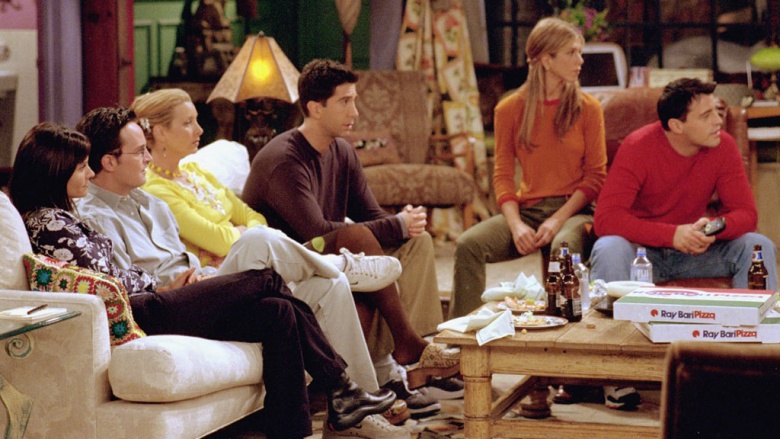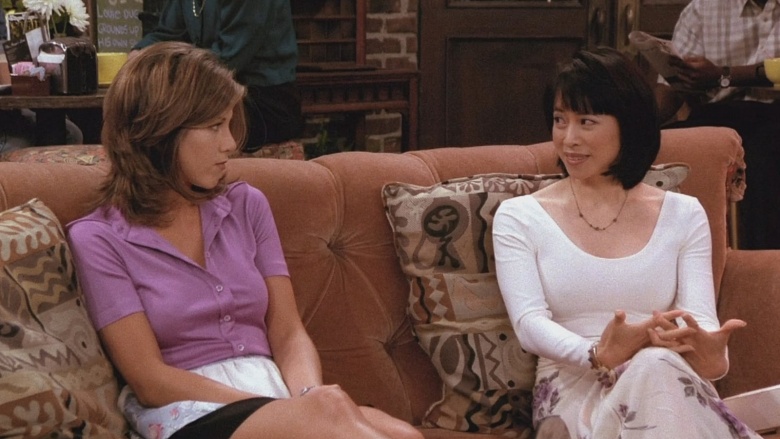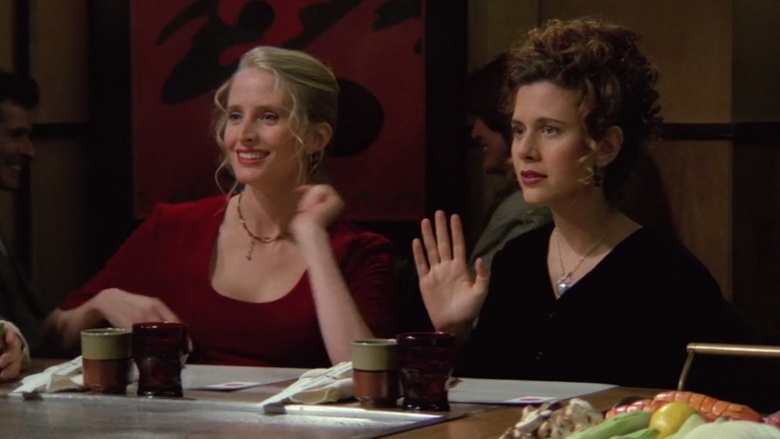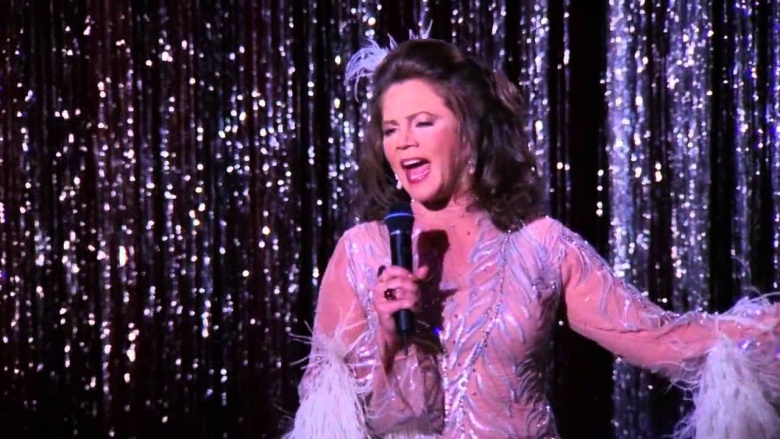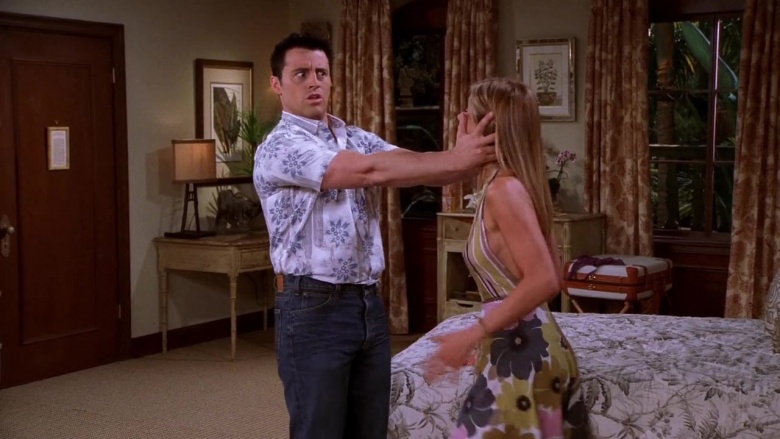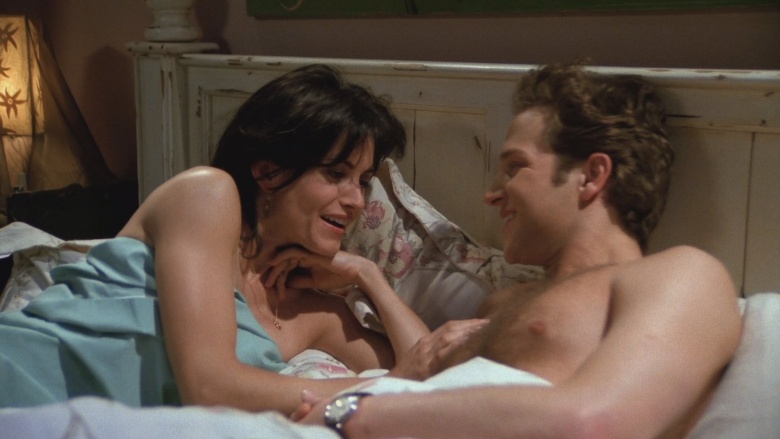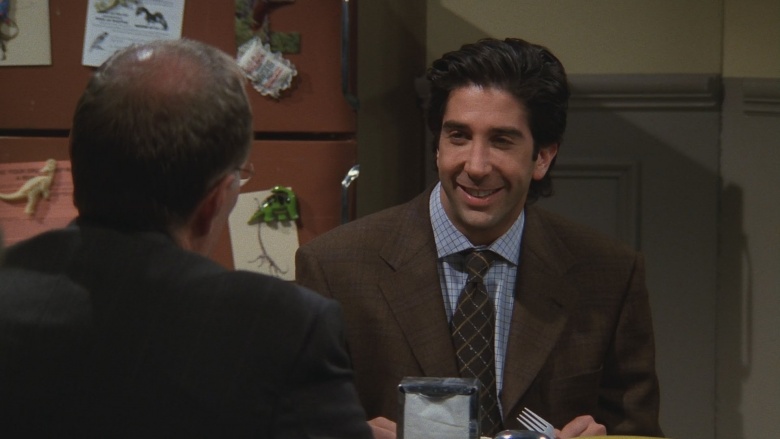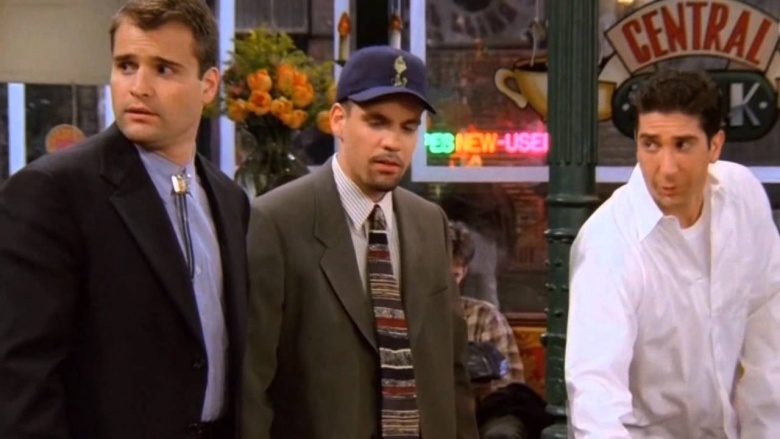Why Friends Would Be Considered Taboo Today
Friends was a massive success during its initial 10-season run but, like a lot of sitcoms of its generation, there were some aspects that have become outdated, and might not hold up by today's entertainment standards. Here's why even the show's super-fans might agree that Friends would probably be taboo if it originally aired now.
The ones with all the white people
Not only were the six main cast members of Friends — Courtney Cox, Jennifer Aniston, Matthew Perry, David Schwimmer, Lisa Kudrow, and Matt LeBlanc — all Caucasian actors, but the vast majority of its guest stars and background actors were white as well. There were few exceptions, and even those were sometimes problematic. The two black actresses who had small roles in the show — Gabrielle Union as Kristen Lang and Aisha Tyler as Dr. Charlie Wheeler — each dated both Joey and Ross, causing a row between the boys. What was with that common thread?
For the most part, though, the cast list reads like a "Who's Who of White '90s Stars," and reflected nothing of the diversity of its time, especially since the show takes place in New York City.
The ones with all the cultural stereotyping
One character who wasn't white was Julie (Lauren Tom), Ross' girlfriend in the second season. When she first arrived, Rachel made a culturally insensitive remark about her being Asian by slowly saying, "Welcome to our country," as if she had never heard a word of English in her life. Julie clap (clap clap clap)-ed back at her comment with a similarly refrained, "Thanks, I'm from New York," but the damage of her stereotyping was hard to overlook or forgive.
Meanwhile, Joey's Italian family was also heavily pigeonholed, with a violent and crude gaggle of sisters and parents who hated Irish people and griped about the proper preparation of garlic, and a grandmother who didn't speak a lick of English and wore a beggar headscarf. And when Monica got her new job at Alessandro's, the owner made a generalizing comment to his Latino employees that indicated they were all related to one another.
Oh, and let's not forget "the Dutch girl" Margha, who was given a ridiculously dramatic accent and essentially existed only as a plot device for Chandler and Joey's chest-pumping competitiveness, before literally disappearing and being forgotten about altogether. So, suffice it to say that whenever there were People of Color, or of other ethnicities, on the show, they were often painted with a brush that would be considered much too broad by today's norms.
The ones with all the homophobia
On one hand, Friends was potentially ahead of its time by having so many of its central characters being so closely affiliated with members of the LGBTQ community. On the other, a lot of their interactions with, and conversations about, those characters would probably be met with backlash if they happened today because they tended to be pretty homophobic.
The instances of gay jokes that might be considered cringeworthy in retrospect are numerous, including the Season 2 wedding of Carol and Susan, when Phoebe's body was inhabited by a ghost and loudly scoffed at the sight of two women getting married. There's also the time when Chandler described his worst Thanksgiving ever by describing the "pool boy" his father ran away with as a wildly cartoonish version of a homosexual man.
Sometimes the scenes were purposefully caricature-esque, like when Phoebe's ice dancing ex-husband revealed that he was straight in a method that parodied the traditional on-screen "coming out" conversation. Other times, they were just plain immature, like when Rachel Green snickered uncontrollably at the mere mention of the word "homo" in Ross' keynote speech from the Season 9 finale. Would these kinds of lines make the cut in today's TV world without creating a public stir? Probably not.
The ones with the transphobia
Just as Friends' gay characters were hit with some major mockery, so were its transgender folks. The longest-running example of this comes by way of Charles Bing, played by Kathleen Turner, whose transition status is left unclear but is mocked by Chandler's mother for having "a little too much penis for that dress." The Friends characters' confusion over how to treat and talk about Bing, whose stage name is Helena Handbasket, is endlessly played upon by Chandler who continues to call this parent "Dad," despite the obvious lifestyle changes involved.
This lack of attention to proper pronouns, consistent ridicule of Bing's status as a transgender person, and the fact that Chandler blames his parents' lifestyle choices for so many of his personality issues would probably not be nearly as funny or well-received by today's standards. It might also be considered unacceptable that a transgender woman like Bing was played by a cisgender actress like Turner.
The controversial treatment of transgender characters didn't stop with Bing. In a scene when Chandler and Monica visited Vegas to invite Bing to their wedding, they attended her burlesque show and were waited on by a transgender waitress (portrayed by the late Alexis Arquette, Courteney Cox's sister-in-law at the time). Monica fumbled and bumbled time and again over whether to call her "waiter" or "waitress." That was the joke.
The ones with all the misogyny
Joey Tribbiani's constant womanizing was a mainstay of his character throughout the series — the only time he showed any true emotion for a woman was when he developed feelings for then-pregnant Rachel, and it was ridiculous.
Plus, although all of his encounters were consensual (that we know of), he often made light of the fact that he didn't know (or care about) the details of his partners and was just using them for sex. Consider the time he said he knew "lots of women" but, when asked for their names, he couldn't muster a single one. Or how Chandler was routinely expected to make Joey's bed buddies pancakes and talk to them in the morning, before they were sent away for good. Joey was rarely ever a one-woman man and was known to objectify (or altogether ignore, like the time he ran into his ex-girlfriend Ginger and hid behind the coat rack) women.
Ross has been known to belittle his romantic interests, as well. For example, in the episode when the Europe Story failed to end his "dry spell," he constantly demeaned his date, and got visibly frustrated when it became clear that the two weren't heading for the bedroom after his tall tale went wrong. And when Denise Richards guest-starred as his cousin Cassie, his inner monologue and reaction to her simple behaviors, like eating a hotdog and smiling, were plum disturbing.
The ones with the age differences
Although there were certainly problems to be seen with some of the romantic pairings that the Friends (and their family members) had with people outside of their age ranges, it wasn't their birth dates that were the problems ... in most cases, at least.
While it was creepy enough that Ross dated his former student, and Phoebe's brother Frank married his former teacher Alice, they were still both consensual, adult relationships that could survive the social stigmas (and constant jokes). But what happened between Monica and the high school boy would be a whole different story today.
In that episode, Monica pretends to be 22 to date a guy whom she thinks is in college, and the two have sex, with her taking his virginity. When she ultimately reveals that she's actually 26, he tells her that he, too, has been lying about his age. He's not a senior in college — he's a senior in high school. Wakka-wakka!
While she rightly points out that he's mislead her and that their act makes her a felon, there are never any consequences, apart from them breaking up. Whether or not the tryst constituted statutory rape depends on the legislation of a given state, but it was certainly nothing to laugh about.
The ones with the nervous breakdowns
Mental health issues aren't really considered a laughing matter anymore, but Friends sure had a giggle or ten at the expense of untreated emotional troubles. Not only was Chandler's social anxiety a constant butt of jokes, but Ross "Mental" Geller experienced an actual nervous breakdown when his second marriage ended — the sandwich caper story was a mere catalyst for the symptoms to reveal themselves, really. Instead of rallying around him and making sure he got the proper support, his pals mostly just made fun of his quirks and encouraged him to ignore his diagnosed issues.
Other instances where mental health wellness went by the wayside: when Rachel convinced Paul (Bruce Willis, not the Wine Guy) to open the floodgates of his pent-up emotion, and then referred to his show of feelings as him being "a little girl." Then there's the time when Monica was depressed and sleep-deprived over her breakup with Richard, and was simply left alone to fester in her physically debilitating misery. Another time, Phoebe mentioned hearing voices in her head, and no one took it seriously. And let's not forget when Fun Bobby was in recovery for his alcoholism, and was repeatedly made fun of behind his back for being a bore all of a sudden.
The ones with the bullying
Another hot button issue of today is the subject of bullying, and Friends was guilty of glossing over the severity of that situation as well. For example, when Ross and Chandler were basically assaulted by two guys that wanted the big orange couch the Friends had long laid claim to, the taunts escalated into threats of violence, and their spat was only resolved by engaging in combat with another rival crew who tried to lift all of their belongings from outside. The idea that a common enemy makes friends is pretty damn deleterious.
Phoebe was often given a pass for her documented history of violent behavior as well. Among the things she's admitted to doing are: stabbing a cop, mugging Ross and stealing his "geology rocks"-themed backpack, and repeatedly threatening little old ladies, like the "dirty lurker" from Vegas or the woman who put trash in her Christmas donation bin.
So, although the backbone of Friends is, and will always be, the witty banter and unbreakable bond of its six city pals, and those relationships do hold up well, it's clearly lucky to have premiered when it did, as a lot of the "humor" probably wouldn't pass today's litmus test of pop culture sensitivity.

